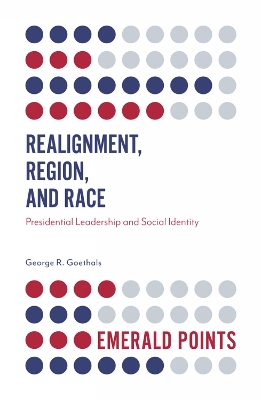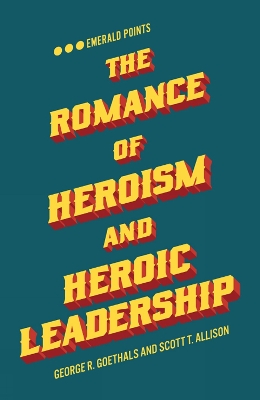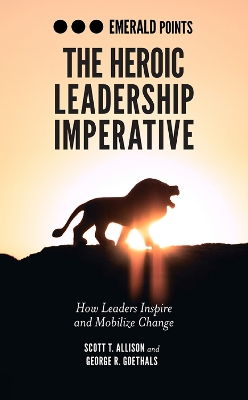Emerald Points
3 total works
The Trump presidency may well be the first phase of a new American political alignment deeply rooted in identity politics. Now more than ever, it seems especially important to understand how leaders compete to engage different human motivations—how presidents, presidential candidates, and other political leaders appeal to potential followers’ needs for economic well-being, safety, self-esteem, and a sense of significance. It is time to come to terms with the roles of race and region in US political history.
In Realignment, Region, and Race, George R. Goethals addresses this challenge head-on, exploring the place of racial dynamics in American politics from Abraham Lincoln to Donald Trump. He integrates psychology and historical understandings of presidential leadership and politics to explain the way the politics of racial justice and needs for positive social identity have led to different regions in the United States changing party affiliation. He describes the realignment by region of the two major political parties in the United States, the Democrats and Republicans, between the Civil War and the present day, and he considers how for over a century and a half the two parties have offered different social identities, often related to race, that appeal to powerful motives for self-esteem and significance. Goethals’s findings uncover deep contexts for understanding how current political leaders engage experiences and attitudes towards African Americans, Hispanic Americans, and Asian Americans in order to tell particular stories about American and regional identities.
Realignment, Region, and Race is essential reading for students of politics, history, and psychology, and it is of keen interest to anyone concerned with the power that identity politics has taken on in recent American elections.
In Realignment, Region, and Race, George R. Goethals addresses this challenge head-on, exploring the place of racial dynamics in American politics from Abraham Lincoln to Donald Trump. He integrates psychology and historical understandings of presidential leadership and politics to explain the way the politics of racial justice and needs for positive social identity have led to different regions in the United States changing party affiliation. He describes the realignment by region of the two major political parties in the United States, the Democrats and Republicans, between the Civil War and the present day, and he considers how for over a century and a half the two parties have offered different social identities, often related to race, that appeal to powerful motives for self-esteem and significance. Goethals’s findings uncover deep contexts for understanding how current political leaders engage experiences and attitudes towards African Americans, Hispanic Americans, and Asian Americans in order to tell particular stories about American and regional identities.
Realignment, Region, and Race is essential reading for students of politics, history, and psychology, and it is of keen interest to anyone concerned with the power that identity politics has taken on in recent American elections.
The Romance of Heroism and Heroic Leadership
by George R. Goethals and Scott T. Allison
Published 19 February 2019
Heroes permeate our culture. From superheroes on screen to the everyday heroics of our public services, the word 'hero' is a familiar descriptor in every form of media. But what makes a hero? And what makes heroes 'heroic'?Leadership experts George R. Goethals and Scott T. Allison explore how the romantic conceptions of heroes and heroic leaders are constructed, both in real life and in our heads. Looking at the dichotomy of heroism and villainy, they offer insights into Donald Trump's ascension to the US presidency, particularly detailing the correspondence between the needs of the US public and the promises the former reality TV star made in reply. They also consider how three highly charismatic men dramatically and fundamentally changed American society in the mid-twentieth century - Martin Luther King (1929-1968), Elvis Presley (1935-1977), and Muhammad Ali (1942-2016), called here the "Three Kings" of the US.
This exciting and innovative study explores how charisma and human needs create images of individuals as heroes and villains. For researchers and students of psychology and leadership, this is a fundamental text on the creation of both genuine heroes, and false idols.
This exciting and innovative study explores how charisma and human needs create images of individuals as heroes and villains. For researchers and students of psychology and leadership, this is a fundamental text on the creation of both genuine heroes, and false idols.
Leaders are expected to be heroic. That is, they are expected to serve three needs of their followers: (1) basic individual needs; (2) group and collective identity needs; and (3) transcendent needs.
The Heroic Leadership Imperative illustrates how leaders who fulfill these expectations succeed attracting followers and initiating social change. Here Scott T. Allison and George R. Goethals identify leaders who have succeeded in meeting all three categories of needs—individuals such as Winston Churchill, Abraham Lincoln, Donald Trump, as well as cult leaders such as Jim Jones—and they discuss such leaders' appeal by way of a unique integration of classic and contemporary psychology relevant to understanding all facets of heroism and heroic leadership. In so doing, the authors explore how heroes and villains have used this leadership imperative to fulfill their ambitions, and provide valuable insights into how societies can avoid falling under the spell of charismatic leaders who misuse the leadership imperative.
For its broad historical coverage, interdisciplinary approach, and relevance to current events, this book is a must-read for scholars and students of leadership studies, and it is of interest to anyone concerned with the political and social upheavals of the past five years.
The Heroic Leadership Imperative illustrates how leaders who fulfill these expectations succeed attracting followers and initiating social change. Here Scott T. Allison and George R. Goethals identify leaders who have succeeded in meeting all three categories of needs—individuals such as Winston Churchill, Abraham Lincoln, Donald Trump, as well as cult leaders such as Jim Jones—and they discuss such leaders' appeal by way of a unique integration of classic and contemporary psychology relevant to understanding all facets of heroism and heroic leadership. In so doing, the authors explore how heroes and villains have used this leadership imperative to fulfill their ambitions, and provide valuable insights into how societies can avoid falling under the spell of charismatic leaders who misuse the leadership imperative.
For its broad historical coverage, interdisciplinary approach, and relevance to current events, this book is a must-read for scholars and students of leadership studies, and it is of interest to anyone concerned with the political and social upheavals of the past five years.


